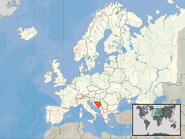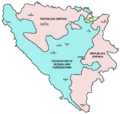Portal:Bosnia and Herzegovina
Welcome to the Bosnia and Herzegovina Portal
 |
 |

| |
Bosnia and Herzegovina (Serbo-Croatian: Bosna i Hercegovina, Босна и Херцеговина), sometimes known as Bosnia-Herzegovina and informally as Bosnia, is a country in Southeast Europe, situated on the Balkan Peninsula. It borders Serbia to the east, Montenegro to the southeast, and Croatia to the north and southwest. In the south it has a 20 kilometres (12 miles) long coast on the Adriatic Sea, with the town of Neum being its only access to the sea. Bosnia has a moderate continental climate with hot summers and cold, snowy winters. In the central and eastern regions, the geography is mountainous, in the northwest it is moderately hilly, and in the northeast it is predominantly flat. Herzegovina, the smaller, southern region, has a Mediterranean climate and is mostly mountainous. Sarajevo is the capital and the largest city.
The area has been inhabited since at least the Upper Paleolithic, but evidence suggests that during the Neolithic age, permanent human settlements were established, including those that belonged to the Butmir, Kakanj, and Vučedol cultures. After the arrival of the first Indo-Europeans, the area was populated by several Illyrian and Celtic civilizations. The ancestors of the South Slavic peoples that populate the area today arrived during the 6th through the 9th century. In the 12th century, the Banate of Bosnia was established; by the 14th century, this had evolved into the Kingdom of Bosnia. In the mid-15th century, it was annexed into the Ottoman Empire, under whose rule it remained until the late 19th century; the Ottomans brought Islam to the region. From the late 19th century until World War I, the country was annexed into the Austro-Hungarian monarchy. In the interwar period, Bosnia and Herzegovina was part of the Kingdom of Yugoslavia. After World War II, it was granted full republic status in the newly formed Socialist Federal Republic of Yugoslavia. In 1992, following the breakup of Yugoslavia, the republic proclaimed independence. This was followed by the Bosnian War, which lasted until late 1995 and ended with the signing of the Dayton Agreement.
The country is home to three main ethnic groups: Bosniaks are the largest group, Serbs the second-largest, and Croats the third-largest. Minorities include Jews, Roma, Albanians, Montenegrins, Ukrainians and Turks. Bosnia and Herzegovina has a bicameral legislature and a three-member presidency made up of one member from each of the three major ethnic groups. However, the central government's power is highly limited, as the country is largely decentralized. It comprises two autonomous entities—the Federation of Bosnia and Herzegovina and Republika Srpska—and a third unit, the Brčko District, which is governed by its own local government.
Bosnia and Herzegovina is a developing country and ranks 74th in the Human Development Index. Its economy is dominated by industry and agriculture, followed by tourism and the service sector. Tourism has increased significantly in recent years. The country has a social-security and universal-healthcare system, and primary and secondary level education is free. It is a member of the UN, the Organization for Security and Co-operation in Europe, the Council of Europe, the Partnership for Peace, and the Central European Free Trade Agreement; it is also a founding member of the Union for the Mediterranean, established in July 2008. Bosnia and Herzegovina is an EU candidate country and has also been a candidate for NATO membership since April 2010. (Full article...)
Selected article -

Lesbian, gay, bisexual, and transgender (LGBT) people in Bosnia and Herzegovina may face legal challenges not experienced by non-LGBT residents. Both male and female forms of same-sex sexual activity are legal in Bosnia and Herzegovina. However, households headed by same-sex couples are not eligible for the same legal protections available to opposite-sex couples.
Bosnia and Herzegovina is a secular country composed of mainly Muslims and Christians (Catholic and Orthodox). While officially secular, religion plays an important role in Bosnian society. As such, attitudes towards members of the LGBT community tend to be quite conservative. Some LGBT events, most notably the Queer Sarajevo Festival 2008, have ended in violence, when "a combination of football fans and religious extremists" stormed the festival while shouting death threats and religious phrases. According to a 2015 survey, 51% of LGBT Bosnians and Herzegovinians reported some form of discrimination directed against them, including verbal abuse, harassment, and physical violence. (Full article...)
General images
More did you know
- ... that Iris Kadrić played international football for Sweden under-17s, before switching to play for Bosnia and Herzegovina?
Cities
- Banja Luka
- Bihać
- Berkovići
- Bijeljina
- Bosanska Krupa
- Bosanski Petrovac
- Brčko
- Brod
- Bugojno
- Cajnice
- Cazin
- Derventa
- Doboj
- Donji Vakuf
- Dubica
- Foča
- Goražde
- Gornji Vakuf
- Gračanica
- Gradačac
- Gradiška
- Ilidža
- Istočno Sarajevo
- Jajce
- Jablanica
- Kakanj
- Kalesija
- Konjic
- Kotor Varoš
- Laktaši
- Livno
- Ljubuški
- Lukavac
- Modriča
- Mostar
- Nevesinje
- Neum
- Novi Grad
- Novi Travnik
- Olovo
- Petrovo
- Prijedor
- Prnjavor
- Sanski Most
- Sarajevo
- Srebrenik
- Srebrenica
- Teslić
- Tešanj
- Travnik
- Trebinje
- Tuzla
- Velika Kladuša
- Visoko
- Vitez
- Zavidovići
- Zenica
- Zvornik
- Živinice
- Žepče
Selected biography -
Michael of Zahumlje (reign usually dated c. 910–935), also known as Michael Višević (Serbo-Croatian: Mihailo Višević, Serbian Cyrillic: Михаило Вишевић) or rarely as Michael Vuševukčić, was a semi-independent, or independent Slavic ruler of Zahumlje, in present-day central Herzegovina and southern Croatia, who flourished in the early part of the 10th century. Prince Michael of Zahumlje had a common boundary with the Serbia and probably with the Kingdom of Croatia, but was an ally of Bulgaria. He was nevertheless able to maintain independent rule throughout at least a majority of his reign.
Michael came into territorial conflict with Petar of Serbia, who expand his power to the province of Narenta or Pagania, west from the Neretva River. To eliminate the threat, Michael warned his ally, the Bulgarian Tsar Simeon I, about the alliance between Peter and Symeon's enemy, the Byzantine Empire. Symeon attacked Serbia and captured Peter, who later died in prison. (Full article...)
List of selected biographies
|
|---|
Did you know (auto-generated)

- ... that Ivan Ančić was the first Bosnian Franciscan to use the Latin script to write in his native language?
Subcategories
Related portals
Religions in Bosnia and Herzegovina
Ex-Yugoslav countries
Other countries
Topics
Recognized content
Things you can do

- Request images:
- Request maps:
- Sarajevo city location map
- Articles wanted:
- Clinical Center University of Sarajevo (Koševo hospital);
- Articles needing major work, Be Bold!: **
- Architecture of Bosnia and Herzegovina
- Health in Bosnia and Herzegovina
- Literature of Bosnia and Herzegovina
- List of universities in Bosnia and Herzegovina
- Foreign relations of Bosnia and Herzegovina
- Cinema of Bosnia and Herzegovina
- Subpages of List of settlements in the Federation of Bosnia and Herzegovina
- Stubs needing expansion:
- Featured Portals:
- Featured Pictures:
- Articles with Featured Article Candidate's status within reach:
- Current Featured Candidates:
- Featured Articles: (Don't be too bold!)
- Current Good Article Candidates:
- Good Articles:
- Former Good Articles:
Web resources
- B&H Tourism - Official Web Site
- Tourism Association of the Federation of Bosnia and Herzegovina - Official Web Site
- Tourism Association of Republika Srpska - Official Web Site
- Duga-Tehna
Other links:
- Bosnian National Monument - Muslibegovica House
- "Bosnia and Herzegovina". The World Factbook (2024 ed.). Central Intelligence Agency.
- Bosnia & Herzegovina Economy
- Bosnia and Herzegovina Map
- Bosnia News
- rjecnik.ba English-Bosnian and German-Bosnian On-line Dictionary (in Bosnian, English, and German)
- The State of Media Freedom in Bosnia and Herzegovina: The Public Service Broadcasting Report by the OSCE Representative on Freedom of the Media
Associated Wikimedia
The following Wikimedia Foundation sister projects provide more on this subject:
-
Commons
Free media repository -
Wikibooks
Free textbooks and manuals -
Wikidata
Free knowledge base -
Wikinews
Free-content news -
Wikiquote
Collection of quotations -
Wikisource
Free-content library -
Wikiversity
Free learning tools -
Wikivoyage
Free travel guide -
Wiktionary
Dictionary and thesaurus



















































































